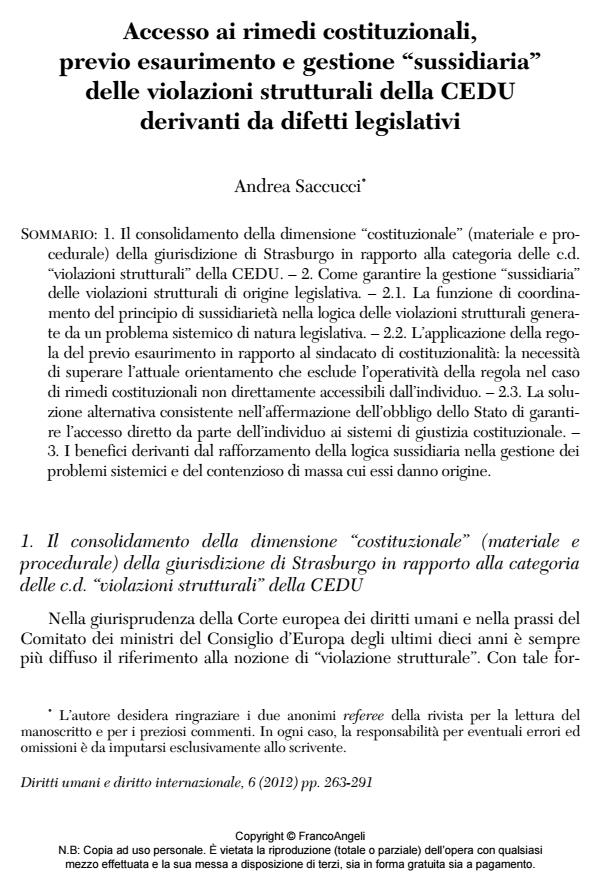Accesso ai rimedi costituzionali, previo esaurimento e gestione "sussidiaria" delle violazioni strutturali della CEDU derivanti da difetti legislativi
Titolo Rivista DIRITTI UMANI E DIRITTO INTERNAZIONALE
Autori/Curatori Andrea Saccucci
Anno di pubblicazione 2012 Fascicolo 2012/2 Lingua Italiano
Numero pagine 29 P. 263-291 Dimensione file 331 KB
DOI 10.3280/DUDI2012-002002
Il DOI è il codice a barre della proprietà intellettuale: per saperne di più
clicca qui
Qui sotto puoi vedere in anteprima la prima pagina di questo articolo.
Se questo articolo ti interessa, lo puoi acquistare (e scaricare in formato pdf) seguendo le facili indicazioni per acquistare il download credit. Acquista Download Credits per scaricare questo Articolo in formato PDF

FrancoAngeli è membro della Publishers International Linking Association, Inc (PILA)associazione indipendente e non profit per facilitare (attraverso i servizi tecnologici implementati da CrossRef.org) l’accesso degli studiosi ai contenuti digitali nelle pubblicazioni professionali e scientifiche
The increasing number of judgments delivered by the Strasbourg Court in cases of human rights violations stemming from a systemic problem in the domestic legal system of a contracting State (so called "structural violations") and the development of the caselaw on the obligation of States to adopt general measures under Article 46 ECHR to remove the causes of such violations (including by amending the relevant legislation) are reinforcing the idea of Court as a sort of pan-European constitutional jurisdiction entrusted with the mandate to safeguard the European public order. At the same time, the "collective" dimension of the protection mandate must always be balanced against the need to afford individual justice to the "victims, calling for a better coordination of the two concurring interests. The article focuses on how to ensure that structural violations of ECHR rights caused by defects of domestic legislation are dealt with in accordance to the principle of subsidiarity, which is at the core of the entire protection mechanism established by the Convention. After highlighting the role of subsidiarity in respect of this particular kind of violations, the author explores two possible alternative developments of the Strasbourg case-law which would contribute to strengthening the cooperation between domestic constitutional jurisdictions and the ECHR system in those States (like Italy) where individuals do not enjoy direct access to constitutional justice. Notably, the author suggests a reinterpretation of the rule of previous exhaustion of domestic remedies in order to allow national judges to assess in the first place whether a law is compatible with the ECHR; in the alternative, the Court should conclude for a violation of the right to an effective remedy under Article 13, imposing on the contracting State the obligation to provide forms of individual constitutional justice at the domestic level that would ensure the "subsidiary management" of structural violations and of the mass litigation arising thereout;
Andrea Saccucci, Accesso ai rimedi costituzionali, previo esaurimento e gestione "sussidiaria" delle violazioni strutturali della CEDU derivanti da difetti legislativi in "DIRITTI UMANI E DIRITTO INTERNAZIONALE" 2/2012, pp 263-291, DOI: 10.3280/DUDI2012-002002